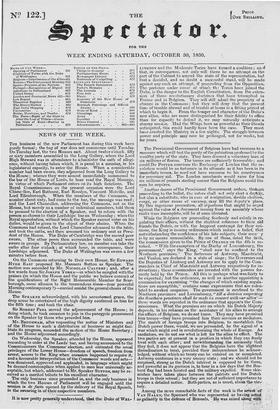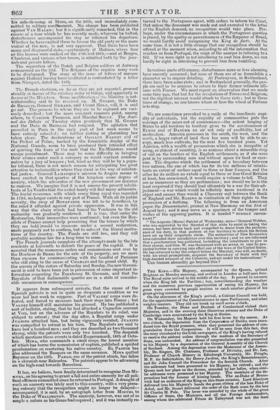wealthy party of the state. They have decreed a voluntary
loan of
six millions of florins. The terms are sufficiently favourable ; and could DE POTTER convince the Exchange of London that the re- volution would be as fortunate in its ultimate as it has been in its
immediate issues, he need not have recourse to his countrymen for pecuniary aid. The London merchants would raise for him six millions of pounds sterling sooner than the Belgians could the sum he requires.
-Another decree of the Provisional Government orders, thattpn proceeding to the ballot, the voters; shall not only elect a deptetr, but also a substitute, who in case of resignation, double election, congg, or other cause of vacancy, may fill the deputy's place. By -this ingenious precaution, all objections that might be urged against the value of a document issuing from an assembly whose ranks were incomplete, will be at once obviated.
While the Belgians are proceeding fearlessly and calmly in re- eulating their affairs, without the slightest reference to their, old friends the Dutch, or with the happiest contempt for their opi- nions, the King is issuing ordinances which induce a belief, that notwithstanding the confidence of his late subjects, their se-cu- y is by no means unassailable. By one of these, dated the 21)th, the commission given to the Prince of ORANGE on the 4th is re- voked. "With the exception of the Duchy of Luxembourg, the government," says the King; "shall now be confined to the Northern provinces." The fortresses of Antwerp, Maestricht, and Venloo, are declared in a state of siege ; the ,Governors and the Deputies of Limburg and Antwerp are to apply to the Com- manders in Chief of Maestricht and Antwerp respectively for in- structions; these commanders are invested with the powers for- merly held by the Prince. All this is perhaps what was fairly to be expected; but the ordinance, as well as another appointing a commission for examining "the changes of which existing regula- tions are susceptible," contains some expressions that are calm- lated to awaken suspicion. The government is confined to the Northern provinces and Luxembourg, "till a decision respecting the Southern provinces shall be made In concert with our allies"— these words are repeated in the ordinance that appoints the Com- missioners. What the promises are on which his Dutch Majesty depends, in his reliance on the assistance of his allies to arrange the affairs of Belgium, we do not know. They may have promised him troops—they have promised him their services as mediators. The march of foreign troops into Belgium, to reestablish the Dutch power there, would, we are persuaded, be the signal of a war which might end in revolutionizing the whole of Europe. As mediators, we do not see what is left for the allies to effect. The two parties are. at present in a position in which they can freely treat with each other ; and notwithstanding the animosity that they feel, it does not appear that the Belgians have the 'slightest disinclination to treat, provided their independence be acknow- ledged, without which no treaty can be entered on or completed. Antwerp continues in a very uneasy state ; and we should not be Surprised, strong as the Dutch interest is supposed to be there, and powerful as its garrison is, to hear in a few days that the Bra- bant flag had been hoisted and the military expelled. Some skir- mishes have taken place between the patriots and the Dutch troops in their retreat ; hut they are not of sufficient importance to require a detailed notice. Bothparties, as is usual, claim t
tory.
Among the more remarkable facts of the week is the ariest VAN HALEN, the Spaniard who was represented as having acted, so gallantly in the defence of Brussels. 7 He was seized along with his aide-de-camp at Mons, on the 20th, and immediately corn- rnitted to solitary confinement. No charge has been published against VAN HALEN ; but it is significantly remarked, that in the course of a tour which he has recently made, wherever he halted, disturbances accompanied his stay or followed his departure. Whether he have excited these to favour the old party or the more violent of the new, is not very apparent. That there have been many and disgraceful riots,—particularly at Malines, where four or five houses were sacked on the 19th and 201h,—and at Bruges, Charleroi, and various other towns, is admitted both by the jour- nals and private letters.
The separation of the Dutch and Belgian soldiers at Antwerp commenced on the 23d. The Belgians of the regular army were to be discharged. The story of the issue of letters of marque against Holland having been meditated is contradicted by a letter from Nieuport, dated the 18th.



























 Previous page
Previous page